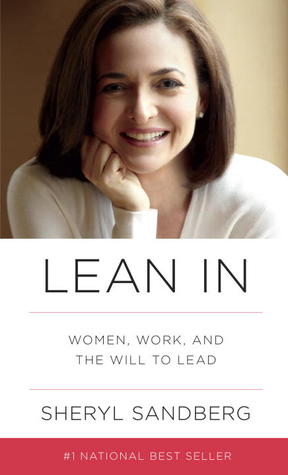 5*/5 This is one book that needed to be written and the right person wrote it. Most people do not become billionaires from employment, Sheryl Sandberg is one of those that did. The chick is minted. If it wasn’t for the fact that her husband collapsed and died at such a young age I would totally want to be her! Such a shame. I actually did not expect to like Sheryl Sandberg or her book because she isn’t really an entrepreneur, she’s always had her pay cheque come from a corporate so I don’t see her as having taken any massive risks with her life but I LOVED her. In fact, I changed my view on her re. not taking risks with her career because I learnt more about her career progression through this book. Long story short, she worked as a management consultant out of university, then had a stint in Government working for Larry Summers from 1996 to 2001 when he was US Treasury Secretary then she decided to go into Technology. She took on a role at Google when Google was a fledgling little company. Her friends laughed at her and thought she was crazy to leave a secure employment path. This is always the case when you do something different but it paid off. She rode Google’s success with them and when she was considering leaving Google for The Washington Post, Mark Zuckerberg asked her to join Facebook as COO instead. It’s a Cinderella employment story. Anyhow, the book is mostly not about her but offers a wide-ranging volume of data and literature on women and the workplace. I really enjoyed the stats and the research collated in the book and I totally value the fact that she is also a mum. Some of my favourite things: 1. Did you know that women hate successful women? Yes, for real. She talks of a study in which a go-getting person is described. In one case the name Howard is used and in another version they keep everything the same but call the person Heidi. After people were asked to read the study and assess the personality of the protagonist, significantly more people gave Hilary negative character traits such as being “aggressive”, “bossy” and other undesirable traits. Indeed, studies show that as men become more successful people like them more but as women become more successful people like them less including other women. Studies also show that traits like “ambition” are seen as positive traits in a man but negative in woman. 2. Sheryl argues that who you marry is possibly the most important career decision you ever make. Your partner will either pull your career up or tear it down. I could not agree more. I love the example she gave of a couple she knows who both have high pressure careers. In their relationship the husband was more naturally suited to preparing school lunches etc. for their kids so his colleagues were surprised when his wife calls while he is out of town to ask what he puts into the lunch box and he recounts whatever it was – sandwich, fruit, juice and cookie, for instance. Then a couple of months later when he is out of town again he gets the same call and again lists the same stuff – sandwich, fruit, juice and cookie. Some people just have knack for certain things and when you take away society’s assigned gender roles from the equation, it can be either the man or the woman. The reason I love this is because it fights common stereotypes about what roles different people should play in a relationship. My husband does a lot of roles that society traditionally expects me to play because he does them better than I do and vice versa. His eye for picking cool clothes, for example, means our son generally looks better when he dresses him up rather than when I do so he’ll frequently dress him before he goes to work. And my keen eye for financial deals means I’m better suited to negotiating new mortgage deals, insurance deals and building our property portfolio Indeed, I know a few friends that fail to progress with their dream because their partner does not support them. 3. Men who do more housework get more sex! Yes, it appears this is the case. Frankly, I think it makes sense. There is nothing sexier than a man that does housework J. 4. Don’t plan your life around having to be a mother or a wife Sheryl Sandberg says lots of women take on smaller roles and refuse promotion opportunities because they are planning on having a baby or getting married. She says go for it with all you have got and take on every opportunity you would ignoring that stuff and essentially cross that bridge when you actually get to it. She mentions on intern who asks for a meeting with her to asks questions about family vs. career planning when she didn’t even have a boyfriend. Laugh along with me, please. 5.The Gender Discount problem She talks about how women get punished for things in the workplace that men do not. Women are presumed to be communal and helpful so if they don’t act to fulfil this they pay a penalty. For example, imagine there is heavy workload at the office, if a male colleague offers to help it’s consider an imposition so he gets compensated with more favourable employment evaluations, e.g. salary increases and bonuses and there are no real consequences if he doesn’t offer to help. A female colleague will get no kudos for helping but will look bad (negative rewards) if she does not offer to help. She goes on to say that men negotiate more for better pay etc. than women but this could be because men are expected to and women can in fact pay a penalty for advocating for themselves due to this gender discount problem. The solution: a woman has to negotiate for the herd. You need to look like you’re not promoting just yourself but everybody or somebody else. She mentions a group of women at Merrill Lynch that met up for lunch weekly and after that lunch would go back to their desks and actly brag about the good work one of their women colleagues was doing. The result: they all ended up getting promoted faster – go figure! 6. You too have biases and hold stereotypes Ultimately, she says we are all biased and hold certain stereotypes whether we like it or not and not acknowledging that we do does more harm than good because we develop a “bias blind spot” in which we fail to recognise and correct for our own biases and prejudices. She sites a study in which people were asked to look at profiles and choose a police chief. Those that declared themselves to be "not biased" were actually found to be much more biased in favour of men than those that admitted they did hold a bias/stereotype. There is so much more I enjoyed about this book but I can't recount it all. A fascinating read available on amazon.com and amazon.co.uk.
0 Comments
|
Heather Katsonga-WoodwardTime allowing, I love to read. If I read anything interesting, I will blog about it here. 2019 Life and Career PlannerCategories
All
Archives
January 2019
|
Heather Katsonga-Woodward, a massive personal finance fanatic.
** All views expressed are my own and not those of any employer, past or present. ** Please get professional advice before re-arranging your personal finances.

 RSS Feed
RSS Feed




